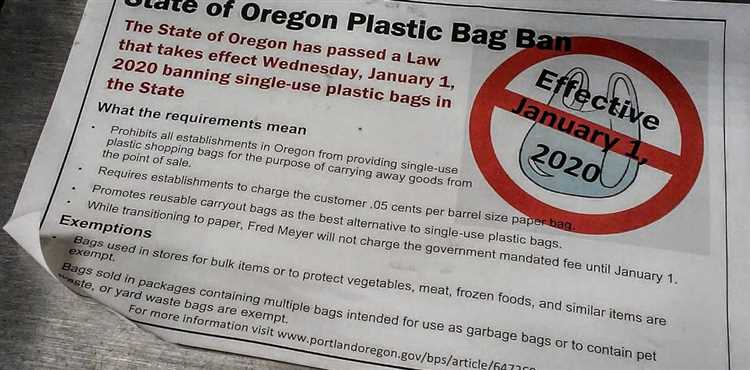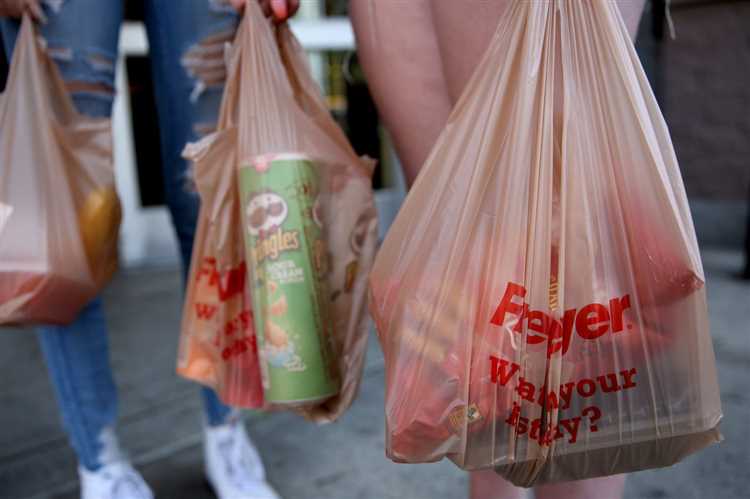Oregon’s Bag Fee is a topic that has sparked both curiosity and debate among residents and visitors alike. This unique policy, which requires a fee for disposable bags, has been in place since 2020 and has raised questions about its purpose and effectiveness. Understanding the reasons behind Oregon’s bag fee is crucial to comprehending the state’s commitment to environmental sustainability and reducing plastic waste.
One of the main reasons behind the bag fee is to encourage a shift towards reusable bags. By implementing this policy, Oregon aims to reduce reliance on single-use plastic bags and promote the use of more sustainable alternatives. Disposable plastic bags are a significant contributor to pollution, often ending up in landfills or polluting natural habitats. By charging for bags, Oregon encourages individuals to bring their own reusable bags when shopping, ultimately reducing the amount of plastic waste generated.
The bag fee also serves as a financial incentive for businesses and consumers to adopt environmentally friendly practices. By charging for bags, businesses are motivated to provide reusable bag options or encourage customers to bring their own. This not only promotes sustainable behavior but also helps businesses save money by reducing their expenditures on disposable bags. Additionally, consumers are more likely to remember their reusable bags when faced with a bag fee, leading to a culture shift towards more eco-conscious shopping habits.
Oregon’s bag fee is part of a broader effort to protect the environment and create a more sustainable future. The state has implemented several initiatives aimed at reducing plastic waste, and the bag fee is just one component of this comprehensive strategy. By charging for bags, Oregon sends a clear message about the importance of waste reduction and conservation. It encourages individuals and businesses to take responsibility for their impact on the environment and promotes a mindset of sustainable consumption.
Overall, Oregon’s bag fee serves as a pivotal tool in the state’s commitment to environmental preservation and reducing plastic waste. By encouraging the use of reusable bags and promoting sustainable habits, Oregon strives to create a cleaner and more sustainable future for its residents and the planet as a whole.
- Why Does Oregon Charge for Bags?
- The Economics of Bag Fees
- Reducing Costs and Environmental Impact
- Incentivizing Behavioral Change
- Environmental Impact of Bag Usage
- The Benefits of Reducing Bag Usage
- Support for Local Businesses
- Question-answer:
- Why does Oregon charge for bags?
- How much is the bag fee in Oregon?
- When did Oregon start charging for bags?
- What happens to the money collected from the bag fee?
- Are there any exemptions to the bag fee in Oregon?
- Why does Oregon charge for bags?
- How much is the bag fee in Oregon?
Why Does Oregon Charge for Bags?
Oregon charges for bags as part of its efforts to reduce single-use plastic waste and encourage the use of reusable bags. The bag fee is part of a larger strategy to promote environmental sustainability and conservation in the state.
By charging for bags, Oregon aims to incentivize consumers to bring their own reusable bags when shopping. This reduces the demand for single-use plastic bags, which are known to contribute to pollution and harm wildlife.
The bag fee also helps to generate funds for environmental programs and initiatives in the state. The revenue collected from the bag fee is often used to support recycling programs, litter prevention efforts, and other environmental initiatives.
In addition to the environmental benefits, charging for bags also has economic advantages. By reducing the use of single-use bags, Oregon saves money on waste management and cleanup costs associated with plastic bag pollution.
Charging for bags is not unique to Oregon. Many other states and cities have implemented similar policies in an effort to reduce plastic waste and promote sustainability. These bag fees have proven to be effective in changing consumer behavior and reducing the environmental impact of single-use bags.
In conclusion, Oregon charges for bags to:
- Reduce single-use plastic waste
- Encourage the use of reusable bags
- Generate funds for environmental programs
- Save money on waste management and cleanup costs
The bag fee is part of Oregon’s broader sustainability efforts and has proven to be an effective strategy in promoting environmental conservation.
The Economics of Bag Fees

Bag fees have become a common strategy for reducing plastic waste and promoting sustainability in many states and countries. In Oregon, the decision to charge for bags is not only an environmental one, but also has economic implications.
Reducing Costs and Environmental Impact
The implementation of bag fees in Oregon helps to reduce the costs associated with plastic bag production and disposal. By charging for bags, it encourages consumers to bring their own reusable bags, which in turn reduces the demand for single-use plastic bags. This reduction in demand not only saves money for businesses, but also helps to reduce the environmental impact caused by the production and disposal of plastic bags.
Incentivizing Behavioral Change
Bag fees act as a deterrent, encouraging consumers to change their behavior and adopt more sustainable practices. When consumers have to pay for bags, they are more likely to think twice about using them and instead opt for reusable alternatives. This shift in behavior not only reduces plastic waste, but also promotes a more sustainable and environmentally-friendly lifestyle.
| Benefits of Bag Fees | Drawbacks of Bag Fees |
|---|---|
|
|
In summary, bag fees in Oregon have economic benefits by reducing costs and the environmental impact of plastic bag production and disposal. They also incentivize behavioral change by encouraging consumers to adopt more sustainable practices. While there may be some drawbacks, such as inconvenience for certain consumers and resistance from businesses, the overall goal of reducing plastic waste and promoting sustainability makes bag fees a worthwhile endeavor.
Environmental Impact of Bag Usage
Bag usage has a significant environmental impact, and this is one of the driving factors behind Oregon’s bag fee program. Single-use bags, such as plastic grocery bags, contribute to pollution and harm wildlife in several ways.
1. Plastic Pollution: Plastic bags take centuries to decompose, leading to a build-up of plastic waste in landfills and oceans. According to the National Oceanic and Atmospheric Administration (NOAA), plastic bags are one of the most common items found during beach clean-ups.
2. Wildlife Threat: Animals, particularly marine species, are at risk from bag usage. Plastic bags can be mistaken for food by marine animals, leading to ingestion and potential entanglement. This can result in injury or death for these creatures.
3. Energy Consumption: The production of plastic bags requires significant amounts of energy and resources. This includes the extraction of fossil fuels and the manufacturing process, which contributes to greenhouse gas emissions and climate change.
4. Litter: Bag usage contributes to littering, creating an unsightly and messy environment. This can have negative impacts on tourism, local businesses, and overall community wellbeing.
The Benefits of Reducing Bag Usage
Reducing bag usage can have numerous positive effects on the environment and communities:
1. Conservation of Resources: By reducing the production and disposal of bags, fewer resources are consumed, including fossil fuels and water.
2. Preservation of Wildlife: Decreasing the demand for plastic bags helps protect wildlife from the dangers associated with bag usage, such as ingestion and entanglement.
3. Reduction of Pollution: With less bag usage, there is a decrease in the amount of plastic waste entering landfills and oceans, leading to a cleaner and healthier environment for all.
4. Promotion of Sustainable Alternatives: By encouraging the use of reusable bags, individuals can make a positive impact on the environment and adopt more sustainable habits.
By charging for bags, Oregon aims to educate and incentivize consumers to make environmentally conscious choices. The bag fee program serves as a reminder of the impacts of bag usage and encourages people to consider alternatives that are less harmful to the planet.
Support for Local Businesses

One of the main reasons behind Oregon’s bag fee is to support local businesses. By charging for bags, the state aims to encourage people to bring their own reusable bags and reduce the demand for single-use plastic bags.
This shift towards reusable bags benefits local businesses in several ways:
- Increased Revenue: When customers bring their own bags, local businesses can save money on purchasing disposable bags, which increases their profit margins. The bag fee provides an incentive for customers to bring their own bags, thereby reducing the expenses for local businesses.
- Environmental Responsibility: Supporting the use of reusable bags aligns with the sustainability goals of many local businesses. By reducing the consumption of single-use plastic bags, these businesses can demonstrate their commitment to protecting the environment and reducing waste.
- Positive Consumer Perception: In an era where consumers are increasingly conscious of their environmental impact, supporting local businesses that promote sustainable practices can improve consumer perception and loyalty. By charging for bags, local businesses can position themselves as environmentally responsible and attract customers who prioritize sustainability.
In addition to supporting local businesses, the bag fee also has positive economic effects for the state. The revenue generated from bag fees can be used to fund environmental initiatives, promote waste reduction programs, and support local communities.
Overall, Oregon’s bag fee not only encourages individuals to adopt more sustainable habits but also provides significant support to local businesses by reducing costs, promoting environmental responsibility, and enhancing consumer perception.
Question-answer:
Why does Oregon charge for bags?
Oregon charges for bags as part of their efforts to reduce litter and waste. By implementing a bag fee, the state hopes to encourage the use of reusable bags and discourage the use of single-use plastic bags.
How much is the bag fee in Oregon?
In Oregon, the bag fee is five cents per bag. This fee applies to paper bags, plastic bags, and even reusable bags, if the customer chooses to receive one.
When did Oregon start charging for bags?
Oregon started charging for bags on January 1, 2020. This bag fee was implemented as part of a law called Senate Bill 90, which was signed by Governor Kate Brown in 2019.
What happens to the money collected from the bag fee?
The money collected from the bag fee in Oregon is used for several purposes. A portion of the funds go towards covering the cost of implementing and enforcing the bag fee program. The remaining funds are used for waste reduction and recycling programs, as well as for education and outreach initiatives to promote sustainable practices.
Are there any exemptions to the bag fee in Oregon?
Yes, there are certain exemptions to the bag fee in Oregon. For example, bags used for bulk items such as fruit, vegetables, nuts, grains, and candy are exempt from the fee. Additionally, bags used for prescription medications, newspapers, and laundry are also exempt.
Why does Oregon charge for bags?
Oregon charges for bags in order to reduce single-use plastic bag consumption and promote the use of reusable bags. The goal is to protect the environment by reducing litter and waste, as well as conserving natural resources.
How much is the bag fee in Oregon?
The bag fee in Oregon is $0.05 per bag. This fee applies to both paper and plastic bags provided by retailers at the point of sale.